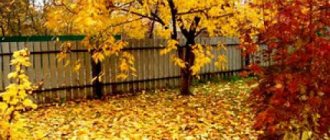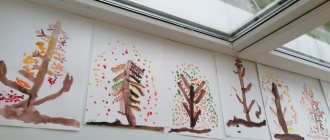Self-analysis of the teacher
This event was held on April 16, 2014 in the middle group. Children of middle preschool age. Most children have been attending the group since September 2013.
GCD had the character of a game, and was not the only one in the cycle of etiquette events. Before this, several events were held with the children, united by the theme “Etiquette”: “What is etiquette?”, “If you are polite”, “Table etiquette”, “Away etiquette”, “School of etiquette. We came to the theater,” which were aimed at studying and mastering the rules of behavior in society.
"ETIQUETTE LESSONS"
- the final one in a series of events this academic year.
Program content:
- learn to find the right solutions in various problem situations;
- improve the culture of dialogical speech: listen to the interlocutor, answer questions in complete sentences and phrases;
- practice using polite words;
- cultivate a culture of communication and a culture of behavior;
- develop mental activity in children.
Preliminary work:
memorizing poems about etiquette and polite words.
The lesson is structured in three stages: motivational, meaningful, reflective.
Motivation came from the problem posed: how to help friends get by without quarreling.
Reflective stage: summing up, drawing hearts with sparkles of kindness.
The following technologies were used in GCD: health-saving, gaming, ICT, collaboration technology, and a person-oriented approach.
All requirements for GCD etiquette were met:
— Motivational support: attract one or another external motive that gives the correct way of action a certain value (imitate peers, earn the recognition of an adult, imitate a literary character).
— Aesthetic support: beauty, harmony in the selection of materials.
— Emotional support: an atmosphere of pleasant positive emotions; friendly attitude; sincerity; the teacher’s interest in the children’s success; own emotional manifestations of both children and adults.
— Form of organization: game-activities.
— Features of interaction with children: relying on their life experience; providing a clear, interesting motive for activities in the classroom and psychological support for children.
Overall, I think the event went well. The children participated in the game with interest, showed their good knowledge of the rules of etiquette and at the same time added new information to them.
Thus, we can say that the goal of the event was achieved, the children learned the basic requirements in behavior and communication with people, and mastered the skills of cultural behavior. We can only hope that they will use this knowledge in their lives.
teacher,
GBOU Lyceum No. 1367, preschool department No. 2,
Moscow, Russia
Summary of GCD in the middle group for familiarization with the social world on a winter theme
Lesson in the middle group of a preschool educational institution on the topic: “We have begun to dress warmer”
Author: Tatyana Aleksandrovna Koryakina, teacher of the Municipal Preschool Educational Institution “Kindergarten No. 9 KV”, Bogoroditsk Announcement: I bring to your attention a summary of a lesson on cognitive development, which is designed for the middle age group ( children 4-5 years old).
This summary will be useful to teachers of the middle group. By introducing additional didactic exercises and games, the notes can be adapted for the older age group. The abstract combines the integration of such educational areas as cognitive development - familiarization with the natural world, speech development, artistic and aesthetic development, physical development, social and communicative development. In my work I use this material according to the thematic planning “Winter. Seasonal changes in children's clothing." Summary of educational activities in the middle group for familiarization with the social world “We have started to dress warmer”
Organizer: Educator Materials: Model of a snowflake larger than the palm of your hand, visual illustrations of elements of winter clothing, a box with doll clothes of different seasons according to the number of children, coloring pages on the theme of winter clothing (by sheet per child). Program content: Formation of ideas about the relationship between a person’s clothing and the time of year, formation of the ability to name and classify clothes in accordance with the season, development of ideas about the variety of types of clothing, development of fine motor skills of the hands, attentiveness, development of coherent speech, education of a friendly attitude towards nature, education of the ability to interact with children and adults. Preliminary work: game “Dressing the doll Dasha for a walk” Progress of the lesson: Surprise moment “Magic snowflake”. The teacher calls the children to come into his circle. Teacher: Guys, this morning, when I was going to the garden, such a wonderful snowflake fell right on my shoulder (shows hands to the children)
.
Look, it didn't melt in the room, unlike an ordinary snowflake, so it's magical, and we'll leave it in our group. Guys, tell me what a snowflake feels like to the touch? Children: Cold, melts in your hands. Educator: Yes, indeed, a snowflake is a frozen drop of water. What can we do to prevent our hands from freezing? Children: Put on mittens! Educator: Let's imagine magic mittens (asks several children to describe the presented mittens - color, pattern, stripe)
.
Now let's put on our mittens! The mittens are new, (Clench and unclench fingers) Warm, downy. (Rub your cheeks with your hands) My grandmother knitted them for me, (Make a movement as if knitting) She gave them to me and said: “Now my granddaughter (Close and unclench her fingers) won’t have cold hands.” Educator: We put on the mittens, now we need to play with our magic snowflake so that she doesn’t miss her snowflake sisters! Low mobility game “Take care of your hands” Children are in a circle, you need to quickly pass the snowflake to the next one so as not to freeze your fingers. Educator: Well done guys, no one got frostbitten fingers? Guys, tell me, what time of year is it? What changes have taken place on the street? Children: Winter. Snow fell and it became cold. Educator: How do we know that it’s cold outside? Children: Cheeks and nose get cold. Educator: Indeed, it has become cold outside, the frost stings your cheeks. What do people wear to stay warm in winter? Children: warm clothes! Educator: What are these clothes called? Children: Winter! Educator: That's right, guys. I will read you riddles, and you will find the answer picture on the board! Not shoes, not boots, But they are also worn by feet. We run in them in winter: In the morning to the garden, then home. (Felt boots. Children must show the picture on the board)
In order not to freeze, Five children are sitting in a knitted stove.
(Mittens)
They will tie it around my neck, and I won’t get sick anymore.
Wrapped in it up to my nose, I am no longer afraid of the frost. (Scarf)
There are trees all covered in snow, a white carpet on the ground.
We will wear this headdress for a walk. (Hat)
In the cold winter I go - I wear that fur outfit.
And believe me, I will never freeze in the cold! (Fur coat) Educator: What great fellows you are, you know all the winter clothes! Do you remember yesterday we were packing the Dasha doll for a walk? Let's take the dolls Vera and Natasha for a walk today, together with the doll Dasha! But they don’t know what clothes to choose for their walk. What do we need to do? Children: Choose winter clothes and dress the dolls. Didactic game “What clothes will we prepare for the street?” The box contains prepared doll clothes for different seasons; children need to take turns choosing clothes for the season from the box and dressing the dolls. The teacher helps dress the dolls if necessary. Educator : (check with the children that the winter clothes have been sorted correctly)
Here, the dolls Vera and Natasha can go for a walk with Dasha!
Well done! Now the dolls will definitely not freeze! Guys, pay attention to our tables, while you were preparing the dolls for a walk, the magical snowflake prepared another task for you! Go to your seats. Educator: It turns out that our snowflake misses her sisters very much, guys, let's say goodbye to her and let her go! Breathing exercises “Little snowflake” A small snowflake sat on the palm of your hand -
(
Children show the snowflake) I’ll catch it, sit for a while. (Cover one palm with the other) One, two, three, four, five (Slowly open their palms) Let them fly ( Children blow quietly on their palms) Didactic game “Cut pictures. Winter clothes". Educator: Guys, you all did an excellent job. As a reward, the snowflake left you gifts - coloring books and flew back to a magical land!
We recommend watching:
Summary of educational activities for children of the middle group on the topic: Winter Physical education entertainment “Winter-winter” for children of the middle group of preschool educational institutions Summary of educational activities in the middle group on the topic: Winter Summary of organized educational activities with children of the middle group on the topic: Winter
Similar articles:
Observation “Footprints in the snow.” Middle group
Walk observation in winter in the middle group. Winter clothes

